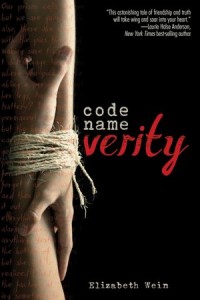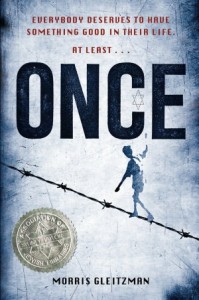Seventy-three years ago, on September 1, German tanks rolled across the border of Poland and the conflict that soon became known as World War II officially began. The literature is vast, even for children. The weight is vast, too, with a level of destruction and death that we find hard to imagine. War stories aren’t happy reading, especially if they take place in Europe, as these novels do. Some reader discretion is advised, but there’s exceptional literary value here.
Code Name Verity, by Elizabeth Wein. Hyperion, 2012, 332 pages. Age/interest level: 14-up.
She’s writing on hotel stationery, unused prescription forms, envelopes and scraps. She tells us that she’s been strapped to a steel rod and tied to a chair for days but what finally got her to talk is the hunger to get her clothes back. For a flannel skirt, a rainbow-colored sweater, shoes one at a time, she’ll tell them everything, starting with this: “I am a coward.”
She goes by many names; we don’t know the real one until almost halfway through the novel. What comes out, in and among the classified info, is how her friendship with Maddie Brodatt, the fearless pilot, sparked and grew, how she enlisted when the war began and moved up through the ranks of British Intelligence to become an interrogator. And now she’s being interrogated! Quelle ironique!—because, with her flawless French, she accepted a mission to France, then made one silly mistake that someone happened to notice.
Code Name Verity (Verity=truth) is described as a story of friendship, but it’s a special kind of friendship—the kind forged between soldiers who risk their lives together in a greater cause. What cause? Though it soon becomes clear that the Germans are willing to do more unspeakable things in their quest to win than the Allies, Maddie has signed up because she loves to fly and “Verity” because she loves adventure. They are romantics, with a touch of Peter Pan in them (note the numerous Pan references), and one grace of this story is that the romance doesn’t completely burn out. Even the enemy have their soft spots, for “People are complicated. There is so much more to everybody than you realize.”
Still, it’s rough. In England, bombing raids rip up the buildings and streets of a proud culture, leaving bodies in the rubble. In France, People are lined up and mowed down, or they just disappear: “more often than not the missing face has been sucked into the engines of the Nazi death machine like an unlucky lapwing hitting the propeller of a Lancaster bomber—nothing left but feathers blowing away in the aircraft’s wake, as if those warm wings and beating heart had never existed.” Devastation is real and loss is permanent, but the crucible of war, which could have devoured our friends, instead forges steel in their characters.
Extremely well-written, challenging, with shutter-speed flashbacks that may confuse the reader at first. It’s worth sticking with, in spite of some bad language and profanity—not nearly as much as there could have been, given the subject matter. It’s a “celebration of the human spirit”—ultimately meaningless without Christ, but even unbelievers can sporadically reflect God’s image, and the tragedy of spoiling it:
Maddie gasped at the river’s inadvertent loveliness, and all at once she found herself spilling childish tears, not just for her own besieged island, but for all of Europe. How could everything have come so fearfully and thoroughly unraveled?
If civilization were worthless, there would be no point in weeping over it. But it’s not, so we do. And next time, God grant that we protect civilization–and fight for it, if need be, as well as our great-grandparents did.
- Worldview/moral value: 3.5 (out of 5)
- Literary value: 5
***Update: Wein has written the prequel to this story, The Pearl Thief, and has added layers to the relationship between Maddie and Rose: essentially, the two girls were lovers when they were girls. We do not think that Code Name Verity must be read with that interpretation, but clearly the author does. We recommend Code Name Verity with caution and that parents and educators pre-read it. The sequel to Code Name Verity, Rose Under Fire, is worth reading and focuses solely on Rose. It is a hard read, too, though, because it covers PTSD after the concentration camps.
 Once, by Morris Gleitzman. Henry Holt, 2006, 166 pages. Also Then (2008), and Now (2012). Age/interest level: 14-up.
Once, by Morris Gleitzman. Henry Holt, 2006, 166 pages. Also Then (2008), and Now (2012). Age/interest level: 14-up.
“Once I was living in an orphanage in the mountains and I shouldn’t have been and I almost caused a riot. It was because of the carrot.” The carrot is significant because nobody in the orphanage ever gets a whole one in their soup bowl, only small pieces—therefore, it’s a message from Felix’s parent that they’re coming to rescue him. He knows they didn’t want to leave him there, but they had to because he ruined their prospects for going to America: “because [Felix recalls] when you were six, you asked the man at the visa desk if the red blotches on his face were from sticking his head in a dragon’s mouth.” He thinks that’s why his parents’ visa was denied, but now all that is forgiven, and he knows he must sneak out of the orphanage in order to meet them.
It doesn’t work out that way. Felix, adrift in Poland at the age of ten, soon learns that there are people called Nazis who may be angry at his parents for selling books. Or maybe . . . “Maybe it’s not our books the Nazis hate. Maybe it’s us.”
Zelda, the six-year-old girl he meets in his travels, is not one of “us”—even though he first encounters her outside her burning house in the presence of her two dead parents. Though shocked and traumatized, her naturally spunky, sassy character begins to show soon enough. Felix manages to connect with her, and with the orphan children they will meet later, by telling stories. He grew up with stories, as the son of booksellers, and storytelling comes naturally to him. They become his way of making sense of what’s happening—a background narrative to explain the unexplainable when established narratives won’t do: “I hate stories about God and Jesus and Mary and that crowd and how they’re meant to be taking care of us.” One might argue that “that crowd” was taking care of Felix in the orphanage he ran away from, but God’s mysterious ways are beyond him. His tales usually have to do with parents—parents being rescued, or rescuing. “Once” (the first word of every chapter) makes us want to fill in “Once upon a time,” with the obligatory happy ending.
But time runs out for too many characters. That’s why, even though the narrative is simple and often unconsciously humorous, and Felix’s touching naiveté blunts some of the horror, and there are only a couple of bad words, the conclusion of Once is devastating. Then is even more so. Why read them?
Now, the final book of the trilogy, published this year, provides a partial answer. So many years have passed that Felix is an old man living in Australia. He has tried to make his life a redemption story, as a world-famous pediatric surgeon whose son and daughter-in-law are also surgeons. While the son and his wife are away on a Doctors-Without-Borders junket to Africa, their only child Zelda is staying with her grandfather, now retired. Zelda’s life is comfortable, even privileged, and she loves her grandfather. But here, with him, she feels the unease that comes with bearing the shadowy burdens of the past. It starts with her name and the indelible impression of a little girl her grandfather can’t forget. How can she measure up?
I don’t reckon any of this is completely my fault. I reckon the first Zelda should start taking responsibility for some of it. Okay, she was incredibly brave and determined. Okay, she was clever, loving, and never lost hope. Yes, she knew how to cheer Felix up when he needed it. . . . But did she ever stop to think how being perfect was going to make things difficult for other people? . . . How I’d be named after her and spend my life being secondhand and second best? No, I don’t think she did.
We all bear the burdens of the past, whether we know it or not. What Zelda 2 knows about Zelda 1 will help in her own private holocaust, beginning with her run-ins with a local bully and culminating in the devastating brushfires of Victoria province, 2009. Now is not as focused as the other two and wouldn’t stand well alone, but it’s a fitting conclusion to one man’s story. What does it all mean? That’s best left to the reader. As Felix himself explains, “Stories always work best when you don’t try to tell people what they’re about.”
- Worldview/moral value: 3.5
- Literary value: 4.5
Read Emily’s thoughts about Anne Frank here. Two other World War II holocaust–related novels? are reviewed here. For another WWII book that’s not quite so grim, see Soldier Bear.
Support our writers and help keep Redeemed Reader ad-free by joining the Redeemed Reader Fellowship.
Stay Up to Date!
Get the information you need to make wise choices about books for your children and teens.
Our weekly newsletter includes our latest reviews, related links from around the web, a featured book list, book trivia, and more. We never sell your information. You may unsubscribe at any time.
We'd love to hear from you!
Our comments are now limited to our members (both Silver and Golden Key). Members, you just need to log in with your normal log-in credentials!
Not a member yet? You can join the Silver Key ($2.99/month) for a free 2-week trial. Cancel at any time. Find out more about membership here.

